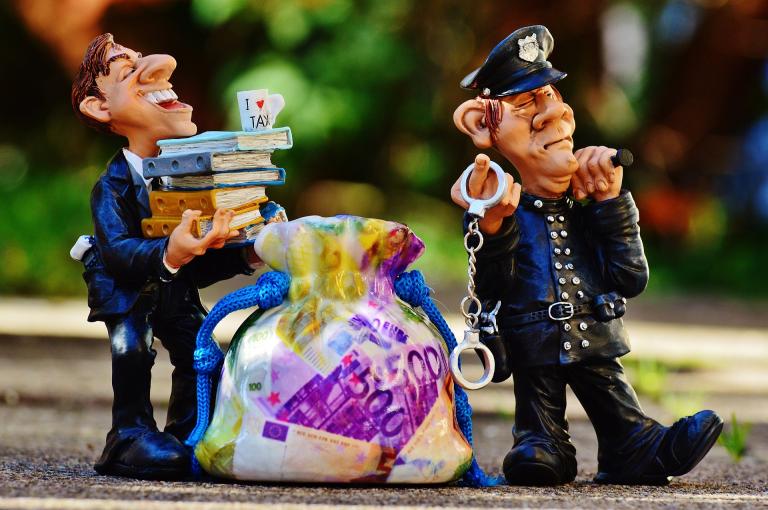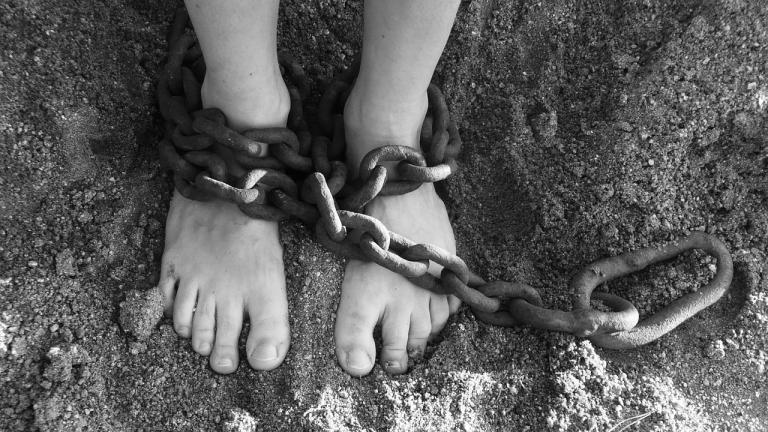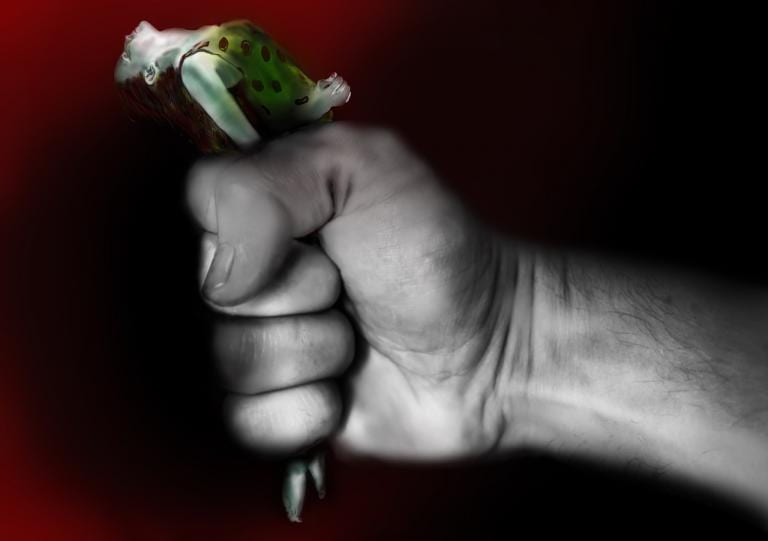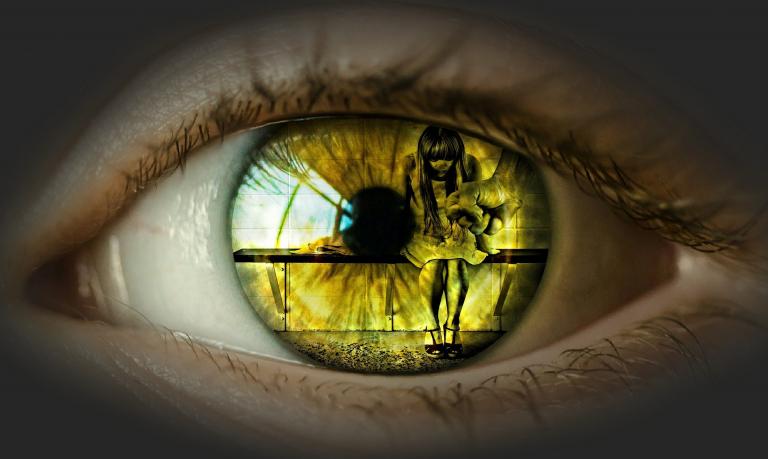The poor of America are living large off the public purse: they own plasma TVs and personal computers. They aren’t going hungry: in fact they eat more protein than the middle class. They own homes, and their living space is larger than that of non-poor people in Europe. The War Against Poverty has been an expensive failure, and it always will be because when it comes right down to it poverty is not caused by a lack of financial resources but by spiritual and moral bankruptcy.
This particular bit of familiar right-wing boilerplate has been making the rounds again recently thanks to an article by Austin Ruse over at Crisis. The piece, titled “Poverty is Not What You Think It Is,” is more or less what you’d expect: an assemblage of cherry-picked statistics designed to create the impression that poor people in America are moochers whose problems would go away if they just took more personal responsibility and relied less on government handouts.
The tactics are painfully familiar. Ruse relies on a small pool of sources from right-wing think tanks and deliberately chooses a handful of seemingly damning statistics, all of which are presented without necessary context. (In a lovely twist of irony, he apparently has a book out called “Fake Science.” Because obviously when you get a Left-wing think-tank together to cook the statistics in favour of their agenda, that is fake science…but when you get a Right-wing think-tank together to do the same thing it’s Truth.)
The biggest problem with Ruse’s piece is that it entirely neglects the reality of living in poverty in the United States. To him the poor seem to be collections of numbers that are used by evil Leftists to wring money out of the hard-working and worthy middle-class. Either that or they are morally bankrupt groups of people whose “real poverty… is spiritual rather than material” and whose problems are primarily caused by “personal behavior, particularly drug use, alcoholism, sex, violence, and many more pathologies.”
So, what does poverty really look like in America?
I’ll start by saying this: poverty in the US scares me. I’ve lived my entire life in Ontario, but I’ve lived in a lot of different types of areas: urban, suburban, college-town, small-town and rural. I’ve done poverty outreach in Toronto and in small cities, and I currently live in a rural area where rates of dependence on government aid is very high – partially because there aren’t a lot of jobs out here, but mostly because we have an aging population and a lot of people who worked hard at low-income jobs all their life simply don’t have the economic reserves to support themselves now that they are out of the workforce.
So I’ve seen a lot of different types of Canadian poverty: the poverty of the old and the sick, the poverty of homeless youth, the poverty of Toronto’s poorer neighbourhoods. I’ve never seen anything that scares me the way that American poverty does.
What you all have down South of the border is an entirely different thing. I don’t care if your poor have plasma TVs and cell-phones and more living space than the average European family (if you’re really interested, by the way, we can talk in the combox about how that particular statistic gets cooked up). Whatever they are experiencing, it’s not the same. The dilapidation, the desperation and the depressing sense of futility are palpable in some US neighbourhoods in a way that I’ve almost never encountered in Canada.
There are reasons for this. The first is that although the US spends a lot on social security, a lot of those payments are delivered in ways that do, in fact, drive welfare dependency and cause bureaucratic inefficiency. The great Catch-22 for the American poor is that both of these problems are exacerbated by the fact that Republicans insist on a narrative of “spiritual bankruptcy” as a driving cause of poverty. As a result they routinely insist on delivering aid in highly controlled ways, with a lot of oversight, to try to make sure that people are not misusing the funds.
Policing public assistance in this way creates access barriers (i.e. red tape) that can make it an almost full-time job just to qualify for government benefits, and that also can prevent those who are actually most in need from adequately accessing services at all. It also requires a massive expenditure on the bureaucratic infrastructure required to try to make sure that low-income Americans are spending their money in approved ways.
It also creates a paternalistic relationship between the state and those who are in need of assistance. It’s super unpleasant and demoralizing to be made to feel like you’re a moral degenerate because you need help. Most poor people internalize the narratives that are promulgated by their culture. If you’re poor and you have to pull out food-stamps at the grocery store while other shoppers look on and sneer, you’re going to feel shame. If you have to constantly prove that you’re not on drugs, you’re going to feel dehumanized. If you are told that you’re a leech because you bought your kid a computer so they could succeed in school, you’re going to feel like you’re damned no matter what you do. If every single one of your pleasures or leisure activities is seen as evidence that you’re a decadent moocher, you’re going to feel like crap.
And here’s the thing: when people feel like human detritus, it generally does not help them to build healthy happy families and communities. Most people, regardless of income, respond to feelings of shame and inadequacy in ways that are fundamentally unproductive. Some will withdraw into depression and find it increasingly difficult to motivate themselves just to get out of bed in the morning. Others respond by striking back: “sticking it to the man,” or seeking social power and recognition through criminal activity or gang membership. Many will seek relief in substances that temporarily dull the feelings of futility and self-loathing.
Nor is it just that these ideas about poverty cause poor people to feel sorry for themselves. The belief that poverty is caused by moral inadequacy doesn’t only affect the mental health of poor people, it also drives the creation of systemic injustices that prevent the poor from being able to build stable families or escape from poverty.
The perception that poverty is linked to moral degeneracy leads to massively inflated rates of arrest and incarceration among low-income, and especially minority, populations. The US has the largest per capita prison population in the world, with poor people, and in particular poor racial minorities, making up a disproportionate share of those who are incarcerated. According to the to the U.S. Department of Justice, more than one in four black males will spend time in prison, and 7.9% of these men will already have served their first prison sentence by the time they are 20 years old. Men with low levels of education have higher rates of imprisonment than their better educated peers (while poor white men are far less likely to be incarcerated than poor black men, they are still at much higher risk than their socio-economically advantaged peers.) If we are looking specifically at poor black communities (rather than the black population generally) we find that extremely high rates of incarceration are, not suprisingly, linked with high rates of domestic instability.
More commonly, though, statistics suggest that criminality appears higher in poor and minority communities because the rates of arrest and conviction are higher. These rates don’t necessarily actually reflect the rate of criminal activity. It is very common for people who have been arrested to be told that things will go better for them if they just agree to plead guilty to a lesser charge – especially if they are relying on public defenders rather than private legal representation.
A criminal lawyer friend of mine says that very often frightened young people will make a deal even though they are not guilty because they don’t believe they can prove their innocence. Once they’ve pled guilty, though, they have a criminal record and are more likely to face spurious charges in the future. He refers to it as “a life sentence on the installment plan” and he advises his clients against it – but he says that most legal aid lawyers don’t want to have to go to the trouble of preparing a case and will simply advise clients to go along with whatever the prosecuting counsel offers.
Obviously, people who can afford to pay for legal representation are substantially less likely to receive poor legal advice and are more likely to be successfully defended.
We can add to this the fact that poor people and minorities are more likely to be arrested for the same offenses vs. their wealthier, whiter peers. For example, research shows that white and black people use drugs at about the same rate, and that whites are actually more likely to sell drugs – yet black people are much more likely to face criminal penalties for these behaviours.
High rates of incarceration drastically effect entire communities. “Over half of all prisoners have children under the age of eighteen, and about 45 percent of those parents were living with their children at the time they were sent to prison.” Research confirms what common sense would naturally tell us: when men are incarcerated this reduces the stability of their relationships and their families, and it has a devastating effect on the future prospects for their children.
Incarceration rates in the US are far, far higher than they need to be in order to safeguard communities or prevent crime. They are higher than they are anywhere else in the world. US prisons do not offer the same kind of rehabilitative services that are usually found in the prison systems of civilized countries. They are overwhelmingly populated by minorities and people of low socio-economic status. Simply put, the poor are being needlessly criminalized and incarcerated at a rate that has a measurable and very negative effect both on the family life and economic prospects of people in poor communities.
Now, here’s the rub. Right-wing writers like Ruse always insist that the problem with poor people is the breakdown of their families. Yet they ignore the realities of systemic discrimination in favour of a narrative which puts the blame on poor people, shaming and stigmatizing them in order to justify the dismantling of essential social services. These narratives in turn drive public demand for the increased use of criminal and carceral solutions to correct the allegedly moral causes of poverty.
Ruse’s approach is profoundly and dangerously disconnected from reality. It does not explain, for example, why rates of “spiritual poverty” would suddenly skyrocket in areas that are economically depressed as a result of overseas competition for manufacturing jobs. It invisibly promotes the notion that certain races (whose economic disadvantages have clear historical and political causes) are morally inferior by suggesting that spiritual, rather than economic, factors cause poverty. It fails to distinguish between the conditions faced by those who are temporarily poor (those who live below the poverty line and require public assistance for a short period) and those who are affected by intergenerational poverty. It is an evil and pernicious fallacy which is blatantly motivated by the need right-wing think tanks to make the Republican party’s avaricious policies palatable to Christians who are supposed to care for the poor.
Worse, the policies that arise from the desire to address the supposed moral failings of the poor are very often policies that make it difficult for people to obtain stable employment, get out of debt, or build healthy families. Instead of providing support that empowers poor people to build better, more dignified lives the Right consistently pushes policies that criminalize poverty, drive welfare dependence, dehumanize the poor and break up poor families. Then they appeal to the very social problems that they have created as “evidence” that poor people are morally bad.
This is the sick narrative that Ruse is pushing with his cooked statistics and his fake science: a narrative that allows people of good will to stomach forms of injustice which are contrary to the teachings of Christ and to the dignity of the human person.
Image credit: pixabay
Stay in touch! Like Catholic Authenticity on Facebook:













